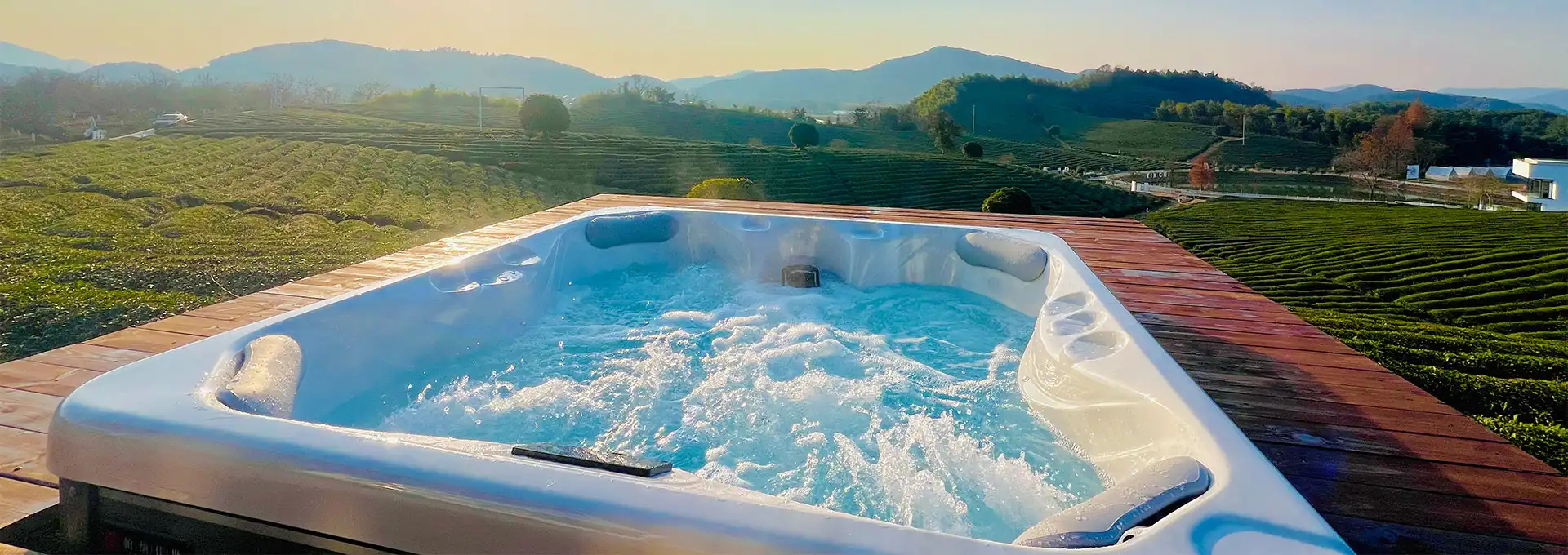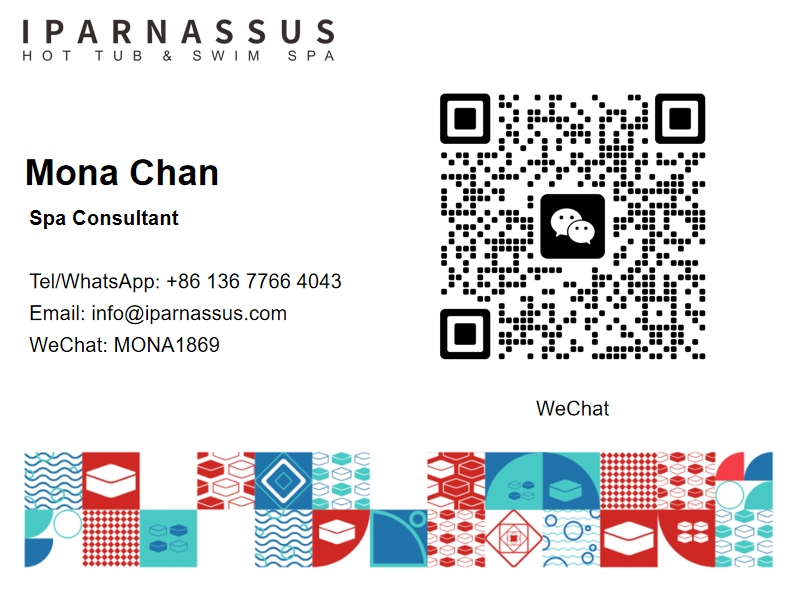Eco-friendly Hot Tub Solutions for Middle Eastern Hotels
2024-11-05 11:22:28
Eco-friendly Hot Tub Solutions for Middle Eastern Hotels
The growing demand for luxury amenities in Middle Eastern hotels has been on the rise in recent years. Hotels in the region are constantly seeking ways to enhance their offerings and attract discerning guests. While hot tubs have become a popular feature, they present unique challenges in terms of sustainability and resource management. The Middle East, known for its arid climate and limited water resources, faces the difficult task of balancing luxury with environmental responsibility.
Maintaining hot tubs in the Middle East comes with specific challenges. The region's high temperatures and low humidity levels lead to increased water evaporation. Additionally, the scarcity of freshwater sources makes water conservation a critical concern. Furthermore, the energy required to heat and maintain hot tubs can be substantial, especially in the region's hot climate.
This blog post explores eco-friendly hot tub solutions tailored for Middle Eastern hotels, addressing water conservation, energy efficiency, and guest satisfaction. We will delve into innovative technologies and practices that can help hotels offer luxurious hot tub experiences while minimizing their environmental impact.
Water Conservation: The Core of Sustainable Hot Tub Solutions
The water scarcity issue in the Middle East is well-documented and poses a significant challenge for the hospitality industry. Many countries in the region rely heavily on desalination plants to meet their freshwater needs, a process that is both energy-intensive and costly. According to the World Bank, the Middle East and North Africa region is home to 6% of the world's population but only 1% of its freshwater resources.
Traditional hot tubs consume large amounts of water, not only for initial filling but also for regular water changes and top-ups due to evaporation. A standard residential hot tub can hold between 400 to 600 gallons of water. In a hotel setting, where hot tubs may be larger and used more frequently, water consumption can be even higher.
To address this issue, innovative water recycling and reuse systems for hot tubs have been developed. These systems aim to minimize water waste and extend the life of the water in the tub. One such system is the closed-loop filtration system, which continuously cleans and recirculates the water, reducing the need for frequent draining and refilling.
Another approach is the use of advanced water treatment technologies that can purify and rejuvenate used hot tub water. For instance, some systems employ a combination of ultraviolet (UV) light and ozone treatment to eliminate bacteria and other contaminants. This process allows the water to be reused multiple times before it needs to be replaced.
Reducing water change frequency offers several benefits. It not only conserves water but also reduces the energy required to heat new water to the desired temperature. Additionally, it minimizes the use of chemicals needed to treat fresh water, saving both resources and reducing the environmental impact of chemical production and disposal.
Advanced Water Treatment and Filtration Systems
Water quality concerns in the Middle East extend beyond scarcity. Issues such as high mineral content and the presence of waterborne pathogens can affect the safety and enjoyment of hot tub use. Effective water treatment is crucial not only for guest safety but also for the longevity of the hot tub equipment.
Cutting-edge filtration technologies play a vital role in maintaining water quality. These systems can remove particles as small as 1 micron, ensuring crystal-clear water. Advanced filtration methods may include multi-stage systems that combine mechanical, chemical, and biological filtration. For example, some systems use activated carbon filters to remove organic compounds and improve water clarity, followed by ceramic filters that can trap microscopic particles.
Bacterial elimination systems are essential for maintaining safe and hygienic hot tub conditions while also contributing to water conservation. Traditional chlorine-based systems, while effective, can be harsh on the skin and eyes, and require frequent water changes to maintain proper chemical balance. Modern alternatives, such as UV-C light sterilization and ozone treatment, offer powerful disinfection without the drawbacks of chemical treatments.
These advanced systems can significantly reduce the need for water changes. By continuously purifying the water, they maintain a safe and comfortable environment for bathers while extending the life of the water in the tub. This is particularly important in the Middle East, where water conservation is a top priority.
Preventing scale buildup and water deterioration is another crucial aspect of maintaining eco-friendly hot tubs. In regions with hard water, such as many parts of the Middle East, mineral deposits can accumulate on surfaces and within equipment. Advanced water softening and descaling systems can help mitigate this issue. These may include electronic descalers that use electromagnetic waves to prevent mineral buildup, or chemical-free, salt-based softening systems.
Energy Efficiency and Renewable Energy Integration
Traditional hot tubs are notorious for their high energy consumption. The constant heating and circulation of water can lead to significant electricity usage, especially in the hot climate of the Middle East, where maintaining cooler water temperatures can be challenging.
To address this, energy-efficient heating and pump systems have been developed. Variable-speed pumps, for instance, can adjust their output based on the hot tub's needs, reducing energy consumption during periods of low demand. Heat pump technology, which extracts heat from the surrounding air to warm the water, can be up to 600% more efficient than traditional electric heaters.
Integrating solar power for hot tub operations is a natural fit for the Middle East, given the region's abundant sunshine. Solar thermal systems can be used to heat the water directly, while photovoltaic panels can generate electricity to power pumps and other equipment. Some hotels have implemented hybrid systems that combine solar heating with traditional methods, ensuring consistent performance even on cloudy days.
Smart control systems play a crucial role in optimizing energy use. These systems can monitor water temperature, usage patterns, and environmental conditions to adjust heating and filtration schedules accordingly. For example, they might reduce heating during off-peak hours or increase filtration after periods of heavy use. Additionally, smart covers can be programmed to close automatically when the hot tub is not in use, minimizing heat loss and evaporation.
The Future of Eco-friendly Hot Tubs in Middle Eastern Hospitality
The growing trend of eco-consciousness among luxury travelers is reshaping the hospitality industry globally, and the Middle East is no exception. Increasingly, guests are seeking experiences that align with their environmental values without compromising on comfort and luxury. Eco-friendly hot tubs represent an opportunity for hotels to cater to this demand while also demonstrating their commitment to sustainability.
The potential for water and energy savings in the hotel industry through the adoption of eco-friendly hot tub solutions is significant. A study by the International Tourism Partnership suggests that hotels could reduce their water consumption by up to 50% through the implementation of water-saving technologies and practices. This not only benefits the environment but also translates to substantial cost savings for hotels in the long run.
Balancing guest expectations with sustainability goals remains a key challenge for hotels. However, as eco-friendly technologies continue to advance, the gap between luxury and sustainability is narrowing. For instance, some hotels are now offering hot tubs with adjustable jets and personalized temperature controls, allowing guests to customize their experience while still benefiting from energy-efficient systems.
Companies like Shenzhen Iparnassus Intelligent Spas Co., LTD. are at the forefront of developing eco-friendly hot tub solutions. Their hot tubs, equipped with circulating filtration and bacteria elimination systems, exemplify the kind of innovations that can make a significant difference in water conservation. Such technologies not only reduce the need for frequent water changes but also ensure a consistently high-quality experience for guests.
As the hospitality industry in the Middle East continues to evolve, eco-friendly hot tubs are likely to become a standard feature in luxury hotels. The combination of water conservation, energy efficiency, and guest satisfaction makes them an attractive investment for forward-thinking hoteliers. Moreover, as awareness of environmental issues grows, hotels that prioritize sustainability are likely to gain a competitive edge in attracting environmentally conscious travelers.
In conclusion, eco-friendly hot tub solutions offer a promising path forward for Middle Eastern hotels seeking to balance luxury with sustainability. By addressing the unique challenges of the region through innovative water conservation and energy efficiency measures, hotels can provide guests with indulgent experiences while minimizing their environmental impact. As technology continues to advance, we can expect even more sophisticated and sustainable hot tub solutions to emerge, further transforming the landscape of luxury hospitality in the Middle East.
Shenzhen Iparnassus Intelligent Spas Co., LTD is a company focusing on Holiday hot tubs and endless swim spas. Our hot tubs are equipped with a circulating filtration and bacteria elimination system, which can reduce the need for frequent water changes. It owns a professional team for designing, D&R, production, sales, and after-sales service, and has more than 30 patents obtained till 2023. The iParnassus® brand covers dozens of countries and regions worldwide. It not only brings high-quality Chinese products to global users but also devotes itself to conveying the syncretic lifestyle of the spa life and the unique Chinese culture.
For more information on hot tub installations and our products, please feel free to contact us at info@iparnassus.com.
References
1. World Bank. (2018). Beyond Scarcity: Water Security in the Middle East and North Africa. MENA Development Report. Washington, DC: World Bank.
2. International Tourism Partnership. (2018). Water Stewardship Report. London: ITP.
3. U.S. Department of Energy. (2021). Energy Saver: Heat Pump Systems.
4. Al-Zubari, W. K. (2017). Water, Energy, and Food Sustainability in the Middle East: The Sustainability Nexus. Springer, Cham.
5. Gössling, S., Hall, C. M., Peeters, P., & Scott, D. (2010). The future of tourism: From transport systems to ICT. Journal of Sustainable Tourism, 18(5), 553-568.
6. Mannan, M., Alhaj, M., Mabrouk, A. N., & Al-Ghamdi, S. G. (2019). Examining the life-cycle environmental impacts of desalination: A case study in the State of Qatar. Desalination, 452, 238-246.
7. Shenzhen Iparnassus Intelligent Spas Co., LTD. (2023). Company Profile and Product Information.
8. Mekonnen, M. M., & Hoekstra, A. Y. (2016). Four billion people facing severe water scarcity. Science Advances, 2(2), e1500323.
9. Energy Star. (2021). Pool Pumps for Consumers.
10. Solar Energy Industries Association. (2021). Solar Heating & Cooling.
Send Inquiry
Related Industry Knowledge
- Are Home and Garden Hot Tubs Reliable?
- Can You Put a Swim Spa Inground?
- Can You Go in a Hot Tub with a Sunburn?
- How to change the swim spa main pump premium leisure?
- How Thick of Concrete for Hot Tub?
- How to keep a cold plunge tub clean?
- What Is Swimming in a Swim Spa Like?
- How Many Gallons In 4 Person Hot Tub?
- Can a Woman Get a Uti From a Hot Tub
- Can You Put a Swim Spa Inground?
_1768872582663.webp)


